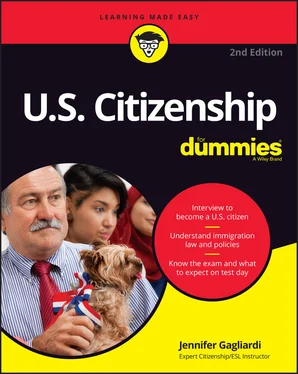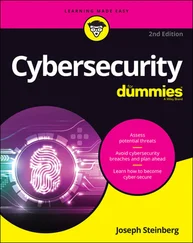Jennifer Gagliardi - U.S. Citizenship For Dummies
Здесь есть возможность читать онлайн «Jennifer Gagliardi - U.S. Citizenship For Dummies» — ознакомительный отрывок электронной книги совершенно бесплатно, а после прочтения отрывка купить полную версию. В некоторых случаях можно слушать аудио, скачать через торрент в формате fb2 и присутствует краткое содержание. Жанр: unrecognised, на английском языке. Описание произведения, (предисловие) а так же отзывы посетителей доступны на портале библиотеки ЛибКат.
- Название:U.S. Citizenship For Dummies
- Автор:
- Жанр:
- Год:неизвестен
- ISBN:нет данных
- Рейтинг книги:3 / 5. Голосов: 1
-
Избранное:Добавить в избранное
- Отзывы:
-
Ваша оценка:
- 60
- 1
- 2
- 3
- 4
- 5
U.S. Citizenship For Dummies: краткое содержание, описание и аннотация
Предлагаем к чтению аннотацию, описание, краткое содержание или предисловие (зависит от того, что написал сам автор книги «U.S. Citizenship For Dummies»). Если вы не нашли необходимую информацию о книге — напишите в комментариях, мы постараемся отыскать её.
U.S. Citizenship For Dummies
U.S. Citizenship For Dummies
U.S. Citizenship For Dummies — читать онлайн ознакомительный отрывок
Ниже представлен текст книги, разбитый по страницам. Система сохранения места последней прочитанной страницы, позволяет с удобством читать онлайн бесплатно книгу «U.S. Citizenship For Dummies», без необходимости каждый раз заново искать на чём Вы остановились. Поставьте закладку, и сможете в любой момент перейти на страницу, на которой закончили чтение.
Интервал:
Закладка:
Noncitizen spouses of U.S. service members may be eligible for expedited naturalization outside the United States. Generally, noncitizen spouses need to have lawful permanent resident status before naturalizing. To apply for adjustment of status, the noncitizen spouse must file Form I-485, Application to Register Permanent Residence or Adjust Status, and the U.S. citizen service member must file Form I-130, Petition for Alien Relative, including the biometrics fee. See USCIS Citizenship for Military Family Members at www.uscis.gov/military/citizenship-for-military-family-members .
MAKING THE BEST OF A BAD SITUATION: THE VIOLENCE AGAINST WOMEN ACT
In order for an alien to qualify for family-based immigration, a U.S. citizen or lawful permanent resident must file a I-130 Petition for Alien Relative form with the USCIS on the alien’s behalf. When, or even if, the petition is actually filed is strictly up to the relative petitioner.
Unfortunately, some people use their control of this process to abuse family members by threatening to report them to immigration authorities. As a result, most battered immigrants are afraid to report the abuse or their abusers.
Passed by Congress in 1994, the Violence Against Women Act (VAWA) allows the spouses and children of U.S. citizens or lawful permanent residents to self-petition for permanent legal immigration status. In order to protect the victims from their abusers, provisions of the VAWA allow certain battered immigrants (women or men) to file for immigration relief without their abusive relative’s assistance or even knowledge. Children of these self-petitioners also receive derivative benefits, meaning they can gain lawful permanent residence along with their parents.
Under VAWA, you may be eligible to become a lawful permanent resident (get a green card) if you are the victim of battery or extreme cruelty committed by any of the following:
A U.S. citizen spouse or former spouse
A U.S. citizen parent
A U.S. citizen son or daughter
A lawful permanent resident (LPR) spouse or former spouse
An LPR parent
You may self-petition under VAWA by filing a Petition for Amerasian, Widow(er), or Special Immigrant (Form I-360) without your abusive family member’s knowledge or consent. A person who files a VAWA self-petition is generally known as a VAWA self-petitioner. If your self-petition is approved and you meet other eligibility requirements, you may be eligible to apply to become a lawful permanent resident.
For further information, see USCIS Green Card for VAWA Self-Petitioner at www.uscis.gov/green-card/green-card-eligibility/green-card-for-vawa-self-petitioner .
Remember: If you are a victim of domestic violence, help is available to you through the National Domestic Violence Hotline. Call 800-799-SAFE (7233) or 800-787-3224 (TDD) for information about shelters, mental health care, legal advice, and other types of assistance, including information about self-petitioning for lawful permanent residence. You can also text “START” to 88788 or chat online at www.thehotline.org/get-help/ .
Using family connections
 Family connections provide the most common path to immigration, and family reunification is a primary goal of the U.S. immigration system. Nonetheless, immigrating through a family connection can be a complex and challenging proposition. Sponsoring relatives have significant obligations to meet before they can bring family members here.
Family connections provide the most common path to immigration, and family reunification is a primary goal of the U.S. immigration system. Nonetheless, immigrating through a family connection can be a complex and challenging proposition. Sponsoring relatives have significant obligations to meet before they can bring family members here.
In order to immigrate through a family connection, your relative must file on your behalf with the USCIS an I-130 petition ( www.uscis.gov/i-130 ) that includes proof of your familial relationship. This petition can now be filed online through a USCIS account ( https://myaccount.uscis.gov/ ).
 Born or naturalized citizens may sponsor their spouses, children, brothers and sisters, and parents. Lawful permanent residents may only sponsor their husbands or wives and children.
Born or naturalized citizens may sponsor their spouses, children, brothers and sisters, and parents. Lawful permanent residents may only sponsor their husbands or wives and children.
Assuming the USCIS approves the I-130 petition your relative filed for you, the State Department must determine if a visa number is immediately available. If you’re an immediate relative of a U.S. citizen, a visa will be available at once. If you fall within a family preference category, you will be placed on a waiting list (you can find more information on preference categories in the earlier section “ Understanding the family preference categories”).
 You can check the status of a visa number in the Department of State’s Visa Bulletin.
You can check the status of a visa number in the Department of State’s Visa Bulletin.
In order for your relative to be eligible to sponsor you to immigrate to the United States, they must meet the following criteria:
They must be a citizen or a lawful permanent resident of the United States and be able to provide documentation proving their citizenship or immigration status.
They must be at least 18 years old, in most cases, and at least 21 years old for U.S. citizen sons or daughters sponsoring a parent.
They must prove and document their relationship to you, the relative being sponsored.
Your relative must also document and prove that they can support you and any other financially dependent relatives at 125 percent above the mandated poverty line.
Your relative must prove they can support you by completing an Affidavit of Support (Form I-864) ( www.uscis.gov/i-864 ) for you to file with the USCIS (if you’re adjusting your status) or with a U.S. consulate (if your visa is processing — there is a filing fee in this case). To complete an Affidavit of Support, your relative must live in the United States as their primary residence. The Affidavit of Support states that the sponsoring relative accepts legal responsibility for financially supporting you. Your relative must be able and willing to accept this legally enforceable responsibility until you go through the entire immigration and naturalization process and become a United States citizen or until you can be credited with 40 quarters of work (which usually takes about ten years).
Your relative must also complete an affidavit of support if they have filed an employment-based immigration petition (Form I-140; www.uscis.gov/i-140 ) as the employer on your behalf or if they have a significant ownership interest (5 percent or more) in a business that filed an employment-based immigrant petition for you.
In determining their income amount, your relative can include in the count
Money held in savings accounts, stocks, bonds, and property
Your income and, in some cases, your assets
The income and, in some cases, the assets of members of your relative’s household related by birth, marriage, or adoption or of those listed on your relative’s most recent federal income tax return (whether or not they reside with your relative)
Not surprisingly, meeting the financial support qualifications presents an insurmountable obstacle to many otherwise willing and qualified potential sponsors. In some cases, if the relative visa petitioner’s household income doesn’t quite reach the minimum 125 percent above the government-mandated poverty level, a joint sponsor may also be allowed to sign an additional affidavit of support. A joint sponsor is someone, other than the family member who is sponsoring you for immigration, who is willing to share legal responsibility, along with your family member, for supporting you if for any reason you are unable to support yourself after immigrating to the United States.
Читать дальшеИнтервал:
Закладка:
Похожие книги на «U.S. Citizenship For Dummies»
Представляем Вашему вниманию похожие книги на «U.S. Citizenship For Dummies» списком для выбора. Мы отобрали схожую по названию и смыслу литературу в надежде предоставить читателям больше вариантов отыскать новые, интересные, ещё непрочитанные произведения.
Обсуждение, отзывы о книге «U.S. Citizenship For Dummies» и просто собственные мнения читателей. Оставьте ваши комментарии, напишите, что Вы думаете о произведении, его смысле или главных героях. Укажите что конкретно понравилось, а что нет, и почему Вы так считаете.












